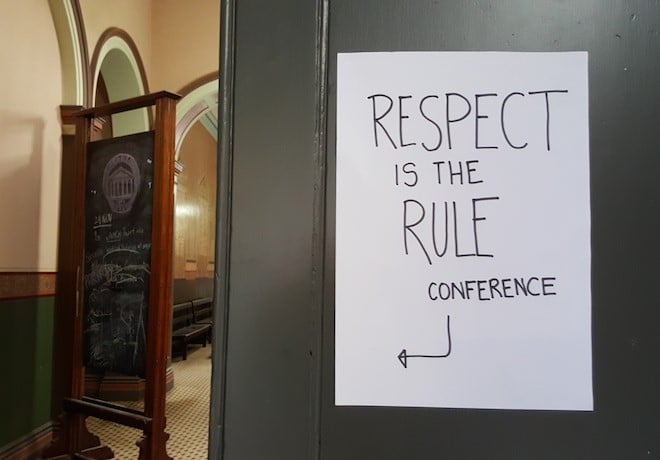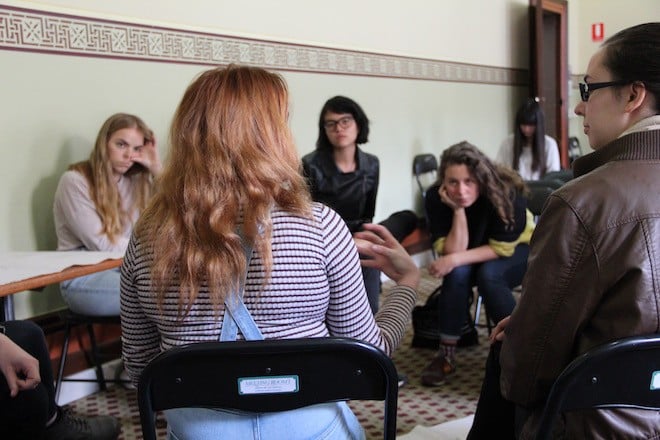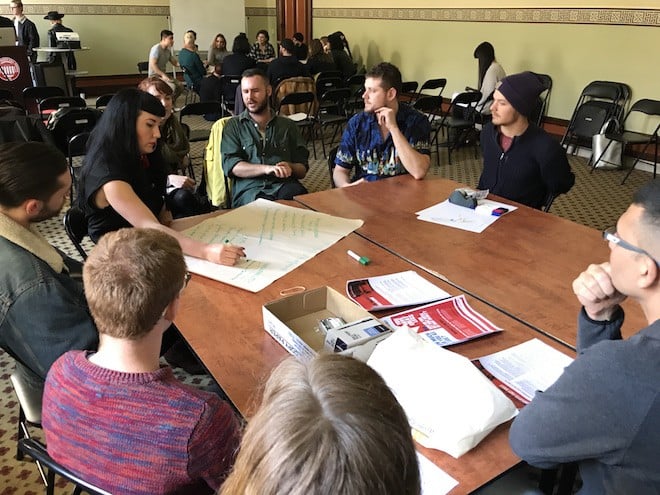Aussie Hospitality Workers Are Uniting To Fight Sexual Harassment
"Everyone has been waiting to have this movement."

Sometimes it’s a comment — “you look like a princess sitting there”. Sometimes it’s insistence on getting personal information out of you — “you don’t look like you’re from here — where are you from?” Other times it’s unwanted physical contact. Or a follow-up on previous unreciprocated behaviour — “you’re still here princess? I should buy you a crown.” And some of the time, it’s worse. Usually, however, your response is to smile politely, and extract yourself from the situation as soon as possible — without seeming unfriendly of course.
If you speak to any hospitality worker, they’ll have a story. About a creepy customer. About a time they felt unsafe. About a time they were treated more as an object than as a person. It’s an odd thing, how sexual harassment has somehow become accepted as something that is now just part of working in the hospitality industry. But, in a field where power hierarchy is essential and “the customer is always right”, it makes an ugly sort of sense.
United Voice Victoria, a labour union based in Melbourne, recently put out a survey to try and pin a number on the sexual harassment that is endemic in the Australian hospitality industry. The results, unfortunately, pretty much found what you would expect; 89 percent of the respondents had experienced sexual harassment.
Respondents reported receiving comments on their body, sexual innuendo and insinuations, unwanted sexual advances and being touched inappropriately. 19 percent reported being sexually assaulted. Now, a number of these people are getting together and trying to do something about it.
Tackling The Elephant In The Room
This week United Voice Victoria held a meeting at Melbourne’s Trades Hall with the aim of taking all this information on board, and making immediate and tangible change. Around 50 hospitality workers attended to hear experts speak, and offer their own experiences and thoughts on what the next steps should be.

There’s a certain type of pessimism that comes with discussing deeply entrenched issues like this. We know they’re a problem, but we also know that they’re deeply systemic. Uprooting the culture that facilitates it is a challenge that seems insurmountable. This reality was acknowledged — with organisers saying that lofty ideals are all well and good, but that the focus was going to be on practical outcomes.
Their goals were simple and direct: build visibility of the issue, and to change employer and worker culture.
Kent St Bar & Cafe manager, Rose Gaumann, has already taken steps to address harassment in Fitzroy and Collingwood, founding ‘Bars of the North’ an online community dedicated to tackling sexual harassment in hospitality, for both workers and customers.
The underlying idea is to build community and accountability; if venues communicate and create firm policies, then a more concrete standard of behaviour can be expected. There isn’t a solid policy yet, but steps have been made including putting up posters in bars encouraging customers to report anything that makes them uncomfortable. The idea of regular communication between venues means that it is less likely that someone will get kicked out of one bar for bad behaviour, only to move onto the next and continue doing what they were doing.
Hospitality worker Rachel Gray helped launch ‘Good Night Out’ in Chicago — the first US outpost of a London initiative. The group focused on visibility and training, going to individual venues and helping them come up with their own sexual harassment policies. Gray said that though training was ostensibly directed at customers harassing workers, by “getting people in a room and setting a standard and agenda”, workers who had experienced harassment were able to share their stories, cementing the seriousness of the issue in the minds of colleagues who hadn’t seen this kind of thing first hand.
Not knowing if your workplace will back you up means that workers end up tolerating more than they should.
Of course, United Voice’s survey and the people in this meeting are just the tip of the iceberg. A call on social media for hospitality workers who had experienced this kind of harassment prompted stories to come in quick and fast.
“A regular that we used to call ‘strong latte’ because that’s the only thing he ever ordered and who wore clothes that looked two sizes too small said that he saw my profile on Tinder,” one worker who preferred to remain anonymous told Junkee.
“He kept on giving me ‘feedback’ on my images (he particularly liked the one where I was standing next to a celebrity mooning) and which order they went in. Every time he came in for the next few months he would ask me about my Tinder and tell me that I should match him when I see his profile. I lied and told him that I hadn’t seen it (I had swiped left immediately when I’d seen his familiar and unwelcome face). I felt very uncomfortable about this but I didn’t speak to anyone about it and I tried to avoid him as much as I could.”

Despite the fact that sexual harassment is one of the industry’s worst-kept secrets, only one third of United Voice’s surveyed workers thought that their employers took the issue of sexual harassment in the workplace seriously. The grey area between being professionally friendly and knowing your rights to tell a customer to back off is particularly large — not knowing if your workplace will back you up means that workers end up tolerating more than they should.
The Next Steps
The main issue with the current situation for hospitality workers in Australia is that there is no formal framework or policy for dealing with sexual harassment in the workplace. While occurences at the more drastic end of the spectrum are clearly criminal, most instances of harassment take place in what many see as a grey area. The standard of behaviour for workers and customers can vary between venues, and many feel that boundaries and processes need to be formalised.
For employees, many choose to let things slide as they don’t know support they will be offered (or, indeed if they will face repercussions for being “rude” or “overly sensitive”). For employers, sometimes it is easier to “manage someone out” — firing someone or subtly encouraging them to quit often seems simpler than tackling the issue head on. As discussed at the conference, this is an industry where sexual harassment is entrenched and there is a naturally high turnover of staff. As a result, a lot of workers felt disposable.
Underscoring the consequences of this culture, Women’s Lead Organiser for the Victorian Trades Hall Council Lisa Heap told the audience that from her work’s research, they’d found that that one in five women in the general Australian workforce had left a secure job due to gendered violence.
United Voices Victoria’s response is “Respect is the Rule” — an initiative that has been in the works for the last month. The idea is to get local businesses to pledge to a zero tolerance policy towards sexual harassment. This will involve making a visible commitment to the initiative (through stickers or posters in the venue) and developing policies to make it clear to both workers and customers what is and is not going to be accepted.
The plan is to first tackle things on a local level. The group are promoting communication between venues in different suburbs, to eventually create a wider culture of zero tolerance towards sexual harassment in hospitality. Some venues have already pledged — and one of the main tasks of this week’s meeting was to set a plan for getting more venues on board.

It’s a realistic goal, and many feel hopeful for things to change. At the forefront of every conversation throughout the meeting were the stories behind the statistics — everyone in the room had their own experience, both of being harassed and of having their concerns dismissed. One worker talked of being harassed every day when she was employed at a German beer hall. When she told her manager, they responded “at least one of us got lucky!”
The meeting wrapped up with a solid plan of action: get local venues to pledge to a zero tolerance policy, and slowly shift the ingrained attitude that it’s just part of the job. As one attendee said when asked to share the results of their discussion “everyone has been waiting to have this movement”. The time has come.
–
You can find and sign on to the pledge here.
–
If you or someone you know is impacted by sexual assault call 1800RESPECT on 1800 737 732 or visit 1800RESPECT.org.au. In an emergency, call 000.
Men can access anonymous confidential telephone counselling to help to stop using violent and controlling behaviour through the Men’s Referral Service on 1300 766 491.
–
Elizabeth Flux is a freelance writer and editor with a focus on film and pop culture. She tweets terrible puns @ElizabethFlux.




